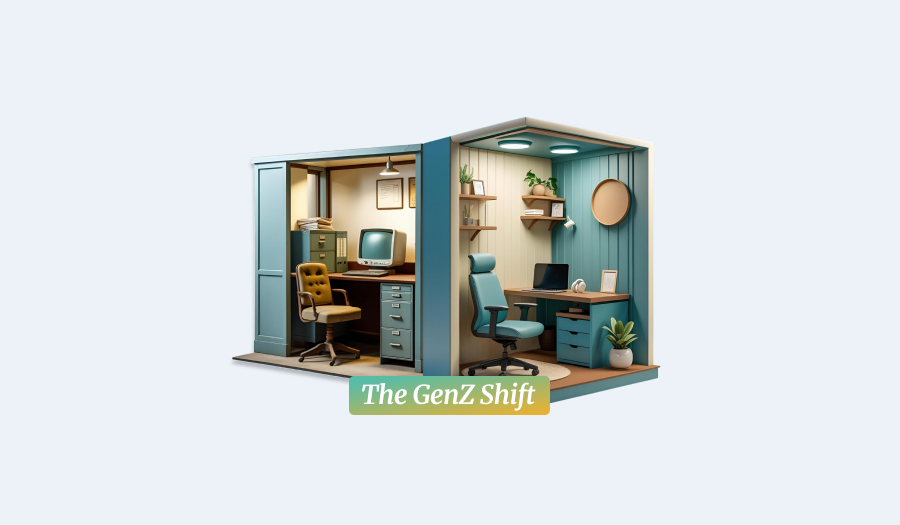Table of Contents
What Gen Z Wants from Employers
How Offshore Teams Are Already Delivering on Gen Z’s Demands
Is Offshore Hiring a Shortcut to a Gen Z-Friendly Workplace?
Final Thoughts
Contributors

Sherry T.
Contributor
As Gen Z fully integrates into the workforce, they are not just taking positions; they are transforming the power dynamics of work. Born and raised in a digital world, this generation seems to demand (and deserve) tech-savvy work environments. More than any previous cohort, they want flexibility and work-life balance. They seek out employers whose values align with their own, which is often hard for small and mid-sized businesses to pull off when competing against larger companies.
Here’s where something unexpected comes into play: offshore teams, often not considered when discussing generational work preferences, might already be better set up to meet many of Gen Z’s demands. So, whether you are a startup building an agile global team or an established company dealing with turnover troubles, understanding how what you want can mesh with what Gen Z wants, and how offshore hiring can help, is more relevant than ever.
What Gen Z Wants from Employers
1. Flexibility is Non-Negotiable
A 2023 Deloitte study found that 65% of Gen Z employees favor hybrid or fully remote work models over conventional office settings. For this generation, flexibility extends beyond just the location of work; it’s about the when and how. They excel in asynchronous environments, placing value on results rather than hours spent.
2. Tech-Enabled Workspaces
Gen Z not only accepts technology but also demands it. They see any buggy process, insufficient communication tools, or outdated system as a clear warning sign. They desire seamless platforms, mobile-friendly tools, and tech that boosts, rather than blocks, productivity.
3. Purpose and Mission Alignment
Members of Gen Z seek more than just a paycheck from their employers. They want to work for companies that share their values, like sustainability and diversity, and inclusion. They want workplaces with a sense of purpose, where they can make a real difference and feel as if they are being valued.
4. Global Mindset and Inclusivity
For Gen Z, diversity is not just a preference; it is a fundamental part of their identity. This generation was brought up on social media and is accustomed to engaging in global conversations. Because of this, they expect, and even demand, multicultural work environments and inclusive organizational cultures.
How Offshore Teams Are Already Delivering on Gen Z’s Demands
Offshore teams in countries such as the Philippines, India, South Africa, and Eastern Europe are built on many of the same principles that Gen Z holds dear: remote collaboration, cultural diversity, and work that is focused on output rather than hours. So why might these offshore teams be the best-kept secret for companies looking to meet the standards of this newest generation in the workforce?
1. Remote-First Infrastructure
Offshore teams are built for remote work. Whether in the Philippines or India, these professionals excel in virtual settings. They are accustomed to asynchronous tools like Slack, Zoom, and Monday (exactly the kind of tech environment Gen Z favors). Platforms such as AbroadWorks simplify the management of international teams with their integrated tools for handling contracts, payroll, and onboarding. This is perfect for companies that are hiring regardless of location.
2. Cultural Fluency and Diversity
Hiring offshore inherently introduces cultural diversity into your company. Teams in countries like South Africa or Mexico offer fresh perspectives and cultural awareness. For Gen Z, working with people from different backgrounds is not just welcomed but expected. Many young offshore professionals are Millennials or members of Gen Z who share many of the same expectations around communication, digital fluency, and autonomy.
3. Mission-Driven Work Opportunities
The idea that offshore teams are driven solely by pay is outdated. Skilled workers in other countries are seeking the same things as Gen Z: purpose-driven work, career progression, and the opportunity to make a difference. Companies that have clear missions, offer good learning opportunities, and present real prospects for growth find eager team members around the world who are just as motivated by the chance to do meaningful work as their counterparts in Gen Z.
4. Agile, Project-Based Mindsets
Gen Z’s perception of employment is heavily influenced by the gig and freelance economy. Offshore workers typically fill project-based roles, remote contracts, or time-flexible shifts, perfect for companies that have adopted agile team structures. Platforms like Upwork and Toptal have popularized this way of working, allowing companies to access offshore talent pools that are comfortable with a high degree of autonomy and ownership.
5. Cost-Effective without Compromising Values
Generation Z is deeply concerned about ethics, including the treatment of offshore workers. Luckily, today’s global hiring platforms make it simple to employ offshore talent legally and ethically with clear contracts, legal protections, and all necessary benefits.
Is Offshore Hiring a Shortcut to a Gen Z-Friendly Workplace?
If you truly want to draw Gen Z talent, both locally and globally, to your organization, you have to reflect the values that matter to them. This includes:
- Flexibility and autonomy in how they work
- The right communication and workflow tools
- Diverse and inclusive teams
- Clear pathways for making an impact and growing within the company
In the global talent market, especially in key offshore destinations, there are many professionals who already embody this mindset. And these professionals aren’t just filling support roles anymore; they’re leading major initiatives across marketing, technology, and customer experience functions in many companies.
Final Thoughts
As Gen Z transforms the workplace, organizations must reconsider team formation and dynamics. Offshore hiring has evolved from a mere cost-cutting measure to a strategic approach for meeting the modern workforce’s expectations. By assembling tech-savvy, diverse global teams that are both flexible and inclusive, companies are not only fulfilling the needs of their newest employees but also creating a more intelligent, adaptable organization overall.
